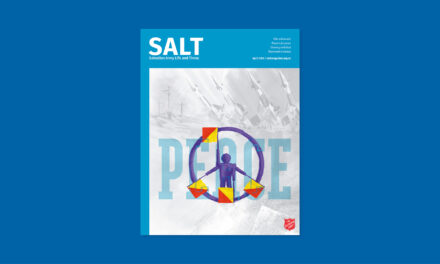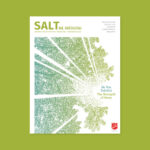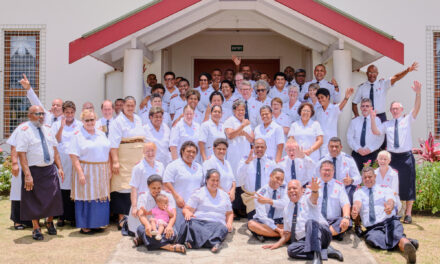
Making a Mess on Purpose in Kāpiti

Many may recall the advertising slogan for Kleenex’s ‘Viva’ paper towels: ‘Life is v. messy—soak it up with Viva!’ And while this could be an apt description for what’s happening at Kāpiti Salvation Army’s ‘Messy Church’, the emphasis is not on cleaning up the mess per se but on soaking up life with all its mess together. SALT sat down with Kāpiti Corps (church) leaders Lt-Colonels Sheryl and Stephen Jarvis, Denise Gray (Messy Church coordinator) and Hannah Medland (communication and creativity champion), to learn about Messy Church and the (good) challenges and opportunities it has added to the life and ministry of the coastal corps.
Sheryl, Stephen, Denise and Hannah all love living and serving on the Kāpiti Coast. ‘It’s a beautiful place to be,’ says Stephen. ‘It feels like you are permanently on holiday,’ explains Hannah, and everyone laughs when Sheryl adds, ‘And it’s also not as windy as Wellington!’
For those who may need some clarity, ‘Kāpiti Coast’ is the umbrella name for the district that extends from Paekākāriki to Ōtaki, including Raumati South, Waikanae and Paraparaumu. Denise has lived on the Kāpiti Coast her entire life and testifies to the vast changes in the population demographics over the past few decades.
‘Kāpiti Coast was once known as the place where people came to retire. But it’s changing, with more and more young families moving out here for the relaxed lifestyle—people wanting to get out of the city. There’s this whole beachy feel here and so much to do. We have beautiful bush walks, river trails, cafés and parks, Saturday morning markets and, of course, the Kāpiti Island tours and overnight stays,’ says Denise. Apparently, there’s some great local ice cream too!
Once an outpost of Paremata Corps (renamed Mana Corps in 2001, which closed in 2013), the work of The Salvation Army in Kāpiti began in 1979, with the corps officially opening in 1980. Today, 43 years on, Kāpiti Salvation Army strongly reflects its community, with predominantly young families and seniors making up the intergenerational corps whānau (family).
Life is v. messy
Although a beautiful place to live, life can be messy on the coast. Like many New Zealand communities, Kāpiti has not been immune to the impact of the rising cost of living.
‘We’ve had a massive increase in the number of people coming to us for help with food. People are either on a lower income and just can’t meet their bills anymore, or they are struggling to make ends meet on the benefit. For others it’s the impact of interest rates. We are now seeing a whole new clientele of people who have bought homes here in the last few years, accessing our services for the first time. These are families we have never seen before,’ explains Sheryl.
‘We are well positioned in the community as a place where people know they can come for help and find care,’ says Sheryl. ‘It’s not just about us, it’s about the needs of the community we are here to serve.’
But housing is by far the most pressing need the Kāpiti Community Ministries team faces. Kāpiti Salvation Army is one of the main housing providers on the coast, with 18 social houses and a government contract to provide 16 transitional houses (they currently have 12). Sheryl honours previous officers Captains Sarah and Andrew Green, who worked hard to broaden Kāpiti’s Community Ministries expression and meet need by taking on a government housing contract.
‘At any one time the team is actively supporting 12 whānau living in our transitional housing properties,’ explains Sheryl. ‘Some of those people are working—not just beneficiaries. That’s totally new for us. We’ve had men who have held down jobs but they can’t secure a rental for their family because they can’t afford it. That’s a really disturbing new trend.’
And while Kāpiti is not known for its crime rate, what happens behind closed doors is another story. Stephen explains that financial challenges put pressure on families. ‘The rise in family harm is real on the coast,’ he says.
A beautiful mess
This is one of the reasons the Kāpiti team are committed to a vision that is strongly relational. ‘We want people’s first experience with us to be really positive,’ affirms Stephen. ‘We want people to experience the warmth of genuine community. We’re about life and hope, and growing relationships. We want to be accessible to one another relationally—with no judgement—to experience God through the love we have for one another. I suppose we’re a bit like The Breeze radio station—not too heavy and not too soft—middle of the road and accessible for everyone.’
Years of ministry experience have shown Sheryl and Stephen that Sunday mornings don’t work for everyone anymore. ‘We wondered if another way to go was offering different kinds of gatherings under the same umbrella,’ says Sheryl. During their service in the Northern Division, the Jarvises had been involved in Messy Church at Royal Oak Community Ministries in Auckland. Messy Church was born in the UK and is a form of church where both adults and children experience God through creativity, celebration and hospitality. It’s primarily for people who don’t already belong to a church.
‘It’s a space where people feel safe, and they can ask the hard questions and not feel embarrassed,’ says Denise. ‘People say they feel right at home at Messy Church—it’s beautiful!’
During their time at Royal Oak Messy Church, Sheryl and Stephen witnessed the transformation that can happen through the creative arts and, of course, the power of sitting down to a meal together. The team agreed that a Saturday evening seemed to be the best night for Kāpiti families to come out, holding the first Messy Church in November 2021. ‘It was a huge faith step,’ says Sheryl.
Hannah is careful to explain the purpose behind the creative arts aspect of Messy Church. ‘Sometimes people think, oh ok, the crafts are the hook that get the people to come along and then you share the gospel. But, no! We are intentionally aiming for a very experiential approach where people are participating and unpacking whatever the faith idea is for the month, with their hands. We’ve been focusing on the questions: Who is God? And how does the Bible reveal who God is to us? But we don’t want to just be offering information, we really want to be offering introductions to God.’


A growing mess
Messy Church attendance reaches anywhere between 70 and 100 people. ‘That’s a lot of people to accommodate and feed! We have some anxious days leading up to Messy Church because we can never be sure if we are going to have enough kai (food), or materials or tables. But we don’t ever want to turn anyone away,’ says Sheryl, who also highlights the key role the Family Store team play in sourcing and supplying craft and activity supplies.
Sheryl explains that it was a challenge figuring out how to practically deliver Messy Church with a predominantly older congregation. ‘But let me tell you, our seniors have got behind this 100 percent and the team who support Messy Church are outstanding! Initially there was concern about the impact Messy Church could have on the existing congregation, but, as Sheryl reports, ‘the real beauty is that both congregations are growing’.
Hannah is so pleased that at Kāpiti there has never been any sense of people wondering when the Messy Church people are going to show up on Sunday. ‘Our Sunday congregation understand and recognise that Messy Church is church—it just meets at a different time and only once a month.’
Sheryl agrees adding, ‘Messy Church is not a feed to the Sunday congregation, that’s not our expectation or a measure of any kind. We just ask what’s the next step for our Messy Church families in the same way we ask that about the Sunday congregation. Are people connecting into men’s groups or life groups and so on? How are the relationships broadening and deepening within the Kāpiti Salvation Army’s overall umbrella?’
Three months ago, Denise was employed not just to coordinate the monthly gathering (that’s a team effort) but to provide follow up and pastoral care to the Messy Church families. ‘We needed someone who could intentionally support their growth and development—coming to church once a month is not sustainable for anyone’s spiritual life,’ explains Sheryl.
The team are excited by what God is doing in and through Messy Church. ‘We are starting to see Messy Church families making connections with other families. They’re exchanging phone numbers and arranging play dates for the kids,’ explains Denise. ‘A big indicator that this really is a congregation in its own right is when members start connecting and supporting each other and building friendships—it’s not just this programme they come to, there’s real ownership now too. We say to our team, if people offer to put tables away, say yes! Because that means they no longer feel like guests but like part of the whānau.’
The next right thing
‘There isn’t this document saying here’s the big strategy for the next ten years, and this is how it’s going to work. Instead, we are just asking … what is the next thing that God is inviting us into?’ explains Hannah.
‘As need arises, we discern together what we should do next—what’s the right thing? We could do that but what would we lose and be taking away? Or how far is that going to stretch us in that season? I’m just really blessed by the people here at Kāpiti, and by the people who God has drawn alongside us,’ says Sheryl.
Stephen finds what he calls the five core purposes of faith framework helpful: ‘Service, worship, evangelism, fellowship, discipleship … I think we are shaped but not constricted by these. When we consider how Messy Church is going, we consider those five things. Yes, they look different to what we have known in the past, but that’s because there is infinite room for creativity within that framework. When we bring our energy and focus to those five areas, what emerges can be as different and wide as God wants to make it.’
Hannah adds, ‘If we were going to add a sixth thing to that framework it would be good food!’
‘Yes!’ agrees Sheryl, ‘We are really good at food!’
‘If you come to MC [Messy Church] you are going to be well fed!’ promises Denise









